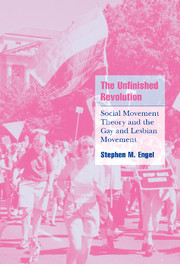Book contents
- Frontmatter
- Contents
- Notes on language
- Preface
- Introduction
- 1 Asked and answered: how questions can condition conclusions in social movement theory
- 2 Tracing the rainbow: an historical sketch of the American gay and lesbian movement
- 3 Tracing the rainbow: an historical sketch of the British gay and lesbian movement
- 4 Where and how it comes to pass: interest group interaction with political institutions
- 5 Asking the unasked question: grappling with the culture variable
- Conclusion
- Appendix: a survey of social movement theories
- Notes
- Bibliography
- Index
1 - Asked and answered: how questions can condition conclusions in social movement theory
Published online by Cambridge University Press: 31 October 2009
- Frontmatter
- Contents
- Notes on language
- Preface
- Introduction
- 1 Asked and answered: how questions can condition conclusions in social movement theory
- 2 Tracing the rainbow: an historical sketch of the American gay and lesbian movement
- 3 Tracing the rainbow: an historical sketch of the British gay and lesbian movement
- 4 Where and how it comes to pass: interest group interaction with political institutions
- 5 Asking the unasked question: grappling with the culture variable
- Conclusion
- Appendix: a survey of social movement theories
- Notes
- Bibliography
- Index
Summary
There are two mistakes to be avoided in trying to explain collective behavior. The crudest is to believe that there exists one privileged motivation – self-interest, for example – that explains all instances of cooperation. A more subtle error is to believe that each instance of cooperation can be explained by one motivation. In reality, cooperation occurs when and because different motivations reinforce each other.
Jon Elster, Nuts and Bolts for the Social SciencesTheory provides a conceptual framework by which to comprehend a series of events. It allows linkages to be drawn between the present and the past while simultaneously enabling predictions regarding the future. Often when explaining a certain event or era, multiple theories exist; some may be compatible, others may not, but usually and most importantly, no one theory is able to elucidate all aspects of these events. No one theory is either mutually exclusive or collectively exhaustive. Historical interpretation is highly dependent upon the framework adopted to investigate a particular phenomenon. In other words, the theory conditions the evaluation by allowing only certain variables to come under the scope, only certain questions to be asked.
Given the parameters of theory, it is often helpful to evaluate how distinct social movement theories account for the same historical event. Divergent understandings derive from the different questions that are asked. This chapter offers a brief overview of various social movement theories including the classical approach, rational choice, resource mobilization, new social movement, and political opportunity structure.
- Type
- Chapter
- Information
- The Unfinished RevolutionSocial Movement Theory and the Gay and Lesbian Movement, pp. 11 - 18Publisher: Cambridge University PressPrint publication year: 2001



